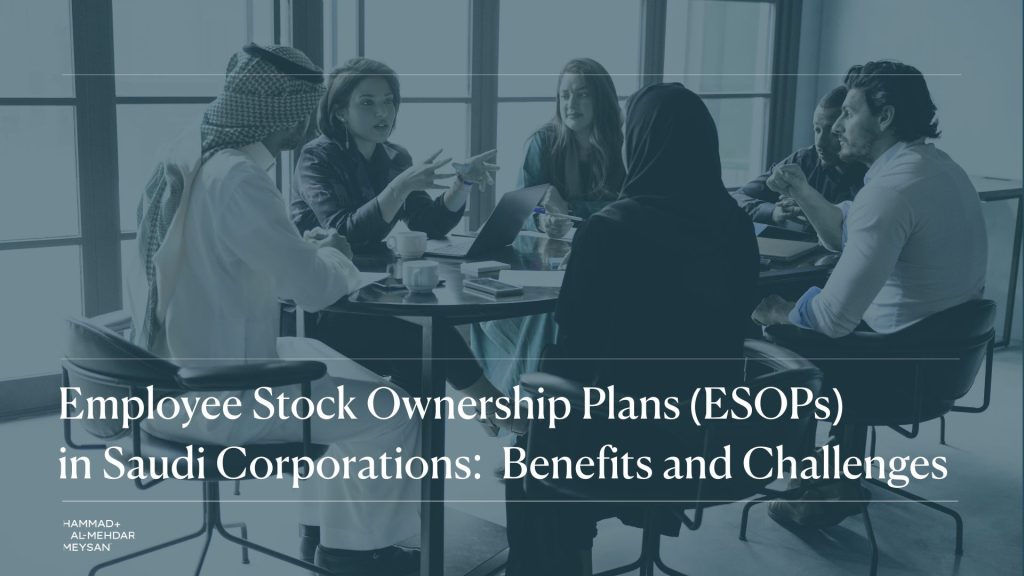
Saudi Arabia’s corporate landscape is evolving rapidly as the country advances its Vision 2030 goals. Central to this transformation is a shift toward more dynamic, transparent, and performance-oriented business models. Among the tools gaining traction in this environment is the Employee Stock Ownership Plan, commonly referred to as an ESOP. These plans are internationally recognised for fostering alignment between employees and shareholders, encouraging long-term commitment, and enhancing organisational performance. In the Kingdom, they are emerging as a credible mechanism to incentivise talent and embed a deeper sense of ownership and accountability within companies.
While ESOPs have been well established in global capital markets, their application in Saudi Arabia remains in the early stages. However, a combination of economic diversification, regulatory reform, and market maturity is accelerating their relevance. Saudi corporations are increasingly exploring how to integrate employee ownership into their business models, particularly as they compete for skilled talent and seek to enhance governance standards.
An ESOP is a structured plan through which employees are granted equity in their company, either in the form of direct share allocation or options that vest over time. These plans serve multiple purposes. They can be used as part of a total compensation strategy, as a mechanism for succession planning, or as a way to preserve cash while rewarding high performers. In a country where many enterprises remain family-controlled or founder-led, ESOPs also offer a structured transition route that reduces dependency on a single ownership group and supports long-term continuity.
Several key factors drive the appeal of ESOPs in Saudi Arabia. First, they serve as a powerful tool for attracting and retaining top-tier professionals, particularly in competitive sectors such as technology, finance, and renewable energy. As employee mobility increases and the demand for specialised skills intensifies, companies are under pressure to offer more than traditional salary packages. Equity-based incentives provide a compelling alternative that fosters loyalty and positions the company as a forward-looking employer.
Second, ESOPs contribute to deeper employee engagement. Ownership instils a sense of responsibility and encourages a performance mindset. Employees who understand that their contributions directly impact the value of their equity are more likely to embrace innovation and collaboration. In the context of Vision 2030, which emphasises productivity and private sector efficiency, this alignment becomes strategically significant.
Third, from a financial management perspective, ESOPs offer cash flow advantages. Particularly for start-ups and high-growth ventures, providing equity instead of cash bonuses or salary increases allows firms to conserve capital while still offering attractive reward structures. This flexibility is critical in an environment where capital efficiency is closely scrutinised.
On the regulatory front, Saudi Arabia has made notable progress. As of 2025, the Capital Market Authority and the Ministry of Commerce have issued updated guidelines to govern the issuance and administration of equity compensation plans. These guidelines enhance transparency, protect employee interests, and create a more predictable legal framework for companies considering ESOP implementation. In parallel, recent tax provisions introduced by the General Authority of Zakat and Tax have clarified the treatment of share-based benefits, addressing earlier ambiguities and enabling more effective planning around ESOP design.
Despite these positive developments, liquidity remains a significant challenge. Many companies exploring ESOPs are not listed on public markets, making it difficult for employees to realise the value of their shares. In response, some firms are adopting internal mechanisms such as structured buy-back programmes or private trading windows that allow employees to convert shares into cash under certain conditions. These practices are still maturing, but they reflect a growing commitment to making ESOPs more practical and rewarding for participants.
Cultural factors also influence the adoption of ESOPs in Saudi Arabia. There is a general preference among many employees for immediate financial rewards rather than deferred equity benefits. Moreover, financial literacy levels vary widely, and the concept of long-term shareholding may not be well understood across all segments of the workforce. Companies looking to implement ESOPs must therefore invest in education and communication. A clear, transparent explanation of the benefits, mechanics, and long-term value of equity ownership is essential to build trust and maximise engagement.
From an operational and governance perspective, best practices are beginning to emerge. These include ensuring alignment between the ESOP and broader business strategy, setting clear eligibility criteria, and embedding strong oversight mechanisms to manage conflicts of interest or disputes. Independent valuation processes, robust documentation, and regular performance reviews are all critical to building credibility and ensuring that ESOPs contribute meaningfully to both employee satisfaction and shareholder returns.
Looking ahead, wider adoption of ESOPs in Saudi Arabia will depend on continued collaboration between regulators, industry leaders, and professional advisors. Policymakers can play a role by introducing further incentives or simplifying compliance requirements. Business associations can help by developing templates, conducting awareness campaigns, and promoting successful case studies. At the company level, leadership teams must ensure that ESOPs are thoughtfully designed, clearly explained, and carefully implemented, with a focus on aligning employee participation with sustainable business outcomes.
As Saudi Arabia pursues economic diversification and a more innovative private sector, ESOPs represent a strategic opportunity. They offer a means to empower employees, reinforce corporate culture, and build value over the long term. While challenges remain in terms of regulation, market readiness, and cultural acceptance, the direction of travel is clear. With careful planning and collaborative effort, employee ownership can become a cornerstone of modern Saudi corporate practice, supporting both national priorities and business growth.
